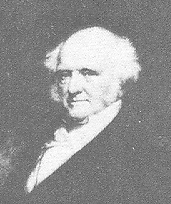Martin Van Buren was born on December 5, 1782 in Kinderhook, N.Y. in, fittingly, a place people came to cast their ballots and gather to talk politics -- Abraham Van Buren's tavern. After his graduation from Kinderhook Academy, Van Buren began working for a local law office. Soon he began a successful career of managing political campaigns. In 1808 he helped Daniel Tompkins become governor of New York. Four years later, Van Buren won a seat in the New York State Senate. Van Buren soon became a key figure in the upstate New York political organization known as the "Albany Regency. He earned the nickname "The Little Magician because of his stature of only five feet six and his political craftiness. Van Buren's success in upstate led to success in Washington. In 1821 Van Buren won a seat in the U.S. Senate. Seven years later President Andrew Jackson appointed him Secretary of State. Van Buren became the vice-president in 1832 and the eighth U.S. President in 1836. He was the first President born in the United States.
The good luck which led to Van Buren's ascent to the presidency turned sour during his one term as president. In 1836, Jackson withdrew federal deposits from the Bank of America in Philadelphia and allotted it to banks around the country and removed restrictions on inflationary practices of some state banks. This created a boom in investments initially, but it led to a bust when consumer confidence in banks dwindled. During Van Buren's presidency hundreds of banks and other businesses failed in what was at the time the worst depression the U.S. history. Also during Van Buren's term a boundary dispute with Canada erupted, relations between the U.S. and Mexico grew tense due to a dispute over what later became Texas, and "the Trail of Tears" led to the death or forced removal of thousands of Native Americans from their homes.
In 1840 Van Buren was soundly defeated by a campaign by William Henry Harrison and John Tyler ("Tippecanoe and Tyler too"). In 1848, Van Buren made an unsuccessful bid for the presidency as candidate for the the Free-Soil Party, a party of Northerners opposed to the expansion of slavery into the western territories.
Following his political career, Van Buren spent two years traveling through Europe. He then retired to a mansion in Kinderhook, N.Y. Martin Van Buren died on July 24, 1862.

